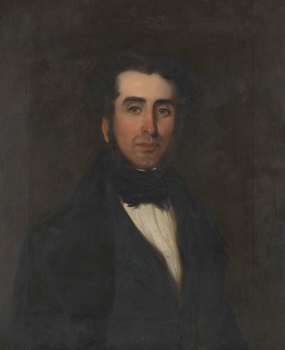Related Research Articles

Bracknell is a rural locality and town in the local government areas of Meander Valley and Northern Midlands in the Launceston and Central regions of Tasmania. The locality is about 22 kilometres (14 mi) south-east of the town of Westbury. The 2016 census has a population of 459 for the state suburb of Bracknell.

The electoral division of Paterson was one of the 15 electorates or 'seats' in the Tasmanian Legislative Council from 1999 to 2008 when a redistribution saw it reverted to its original name of Launceston.

The electoral division of Bass is one of the five electorates in the Tasmanian House of Assembly, it includes north-east Tasmania and Flinders Island. Bass takes its name from the British naval surgeon and explorer of Australia: George Bass. The division shares its name and boundaries with the federal division of Bass.

The electoral division of Braddon is one of the five electorates in the Tasmanian House of Assembly, it includes north-west and western Tasmania as well as King Island. Braddon takes its name from the former Premier of Tasmania, Sir Edward Braddon. The division shares its name and boundaries with the federal division of Braddon.

The electoral division of Pembroke is one of the 15 electorates or 'seats' in the Tasmanian Legislative Council or upper house. It is located on Hobart's Eastern Shore and includes a number of suburbs; Risdon Vale, Geilston Bay, Rose Bay, Lindisfarne, Warrane, Mornington, Bellerive, Howrah and Tranmere. In earlier times, the division included most of the east coast of Tasmania as far north as Bicheno, including the Tasman Peninsula.

The electoral division of Rumney is one of the 15 electoral divisions in the Tasmanian Legislative Council. The division is located in Southern Tasmania to the east of the division of Pembroke.

The electoral division of Nelson is a constituency of the Tasmanian Legislative Council. The division includes many of the suburbs to the south of Hobart, including South Hobart, Sandy Bay, Taroona and Kingston. The division was created in 1999 when the electoral division of Queenborough was renamed in a review of electoral boundaries. The member from 1999 until his retirement in 2019 was independent Jim Wilkinson.

The electoral division of Murchison is one of the fifteen electorates in the Tasmanian Legislative Council, situated in the western/north-west region of the state. It is the largest electorate in size, covering an area of 19,391 km² and includes the municipalities of Circular Head, King Island, Waratah-Wynyard, West Coast and part of Burnie City.

The Electoral division of Huon is one of the 15 electoral divisions in the Tasmanian Legislative Council. It was created in 1999, however similar electorates of this name have existed since 1900, and members of the Tasmanian upper house for this region appear to have been elected since 1856.

The Tasmanian Legislative Council has fifteen single member constituencies, called divisions.

The electoral division of Mersey is one of the fifteen constituencies in the Tasmanian Legislative Council. The division covers an area of 732 km2.

The electoral division of Launceston is one of 15 electorates or seats in the Tasmanian Legislative Council, created in 2008. It also previously existed until 1999, when it was abolished and substantially incorporated into the new division of Paterson, which was in turn abolished in 2008.

The electoral division of Elwick is one of the 15 electoral divisions in the Tasmanian Legislative Council. The division covers most of the municipality of Glenorchy.

The electoral division of Hobart is one of the 15 electoral divisions in the Tasmanian Legislative Council. It was originally created in 1856 when the Council became the upper house of the Parliament of Tasmania. The seat was abolished in 1999 and re-created in 2008 after a redistribution saw the former division of Wellington returned to its former name.
The Electoral division of South Esk was an electoral division in the Tasmanian Legislative Council of Australia. It existed from 1856 to 1999, when it was renamed Apsley. It took its name from the South Esk River.
James Reid Scott was an explorer and colonial Tasmanian politician, member of the Tasmanian House of Assembly and later the Tasmanian Legislative Council, he was also Colonial Secretary of Tasmania.

Robert Quayle Kermode was a British politician. He was a member of the Tasmanian Legislative Council and the Tasmanian House of Assembly in the 1850s and 1860s. In 1852 Godfrey Mundy claimed Kermode to be the richest Manxman in the world, in his book Our Antipodes. Kermode's mansion, Mona Vale, itself was at the time the largest house in Australia.
Periodic elections for the Tasmanian Legislative Council were held on 7 May 2016. The two seats up for election were the electoral division of Apsley and the electoral division of Elwick. They were previously contested in 2010.

The electoral division of McIntyre is one of the fifteen electorates in the Tasmanian Legislative Council, it includes Flinders Island, the northern east coast of Tasmania, and regional areas south and west of Launceston. It is named after Margaret McIntyre, who was the first woman to be elected into the Parliament of Tasmania in 1948.

The electoral division of Prosser is one of the fifteen electorates in the Tasmanian Legislative Council, it includes the south-east coast of Tasmania, the Sorell township and the Tasman Peninsula. Prosser is named after the Prosser River, which flows through the centre of the division.